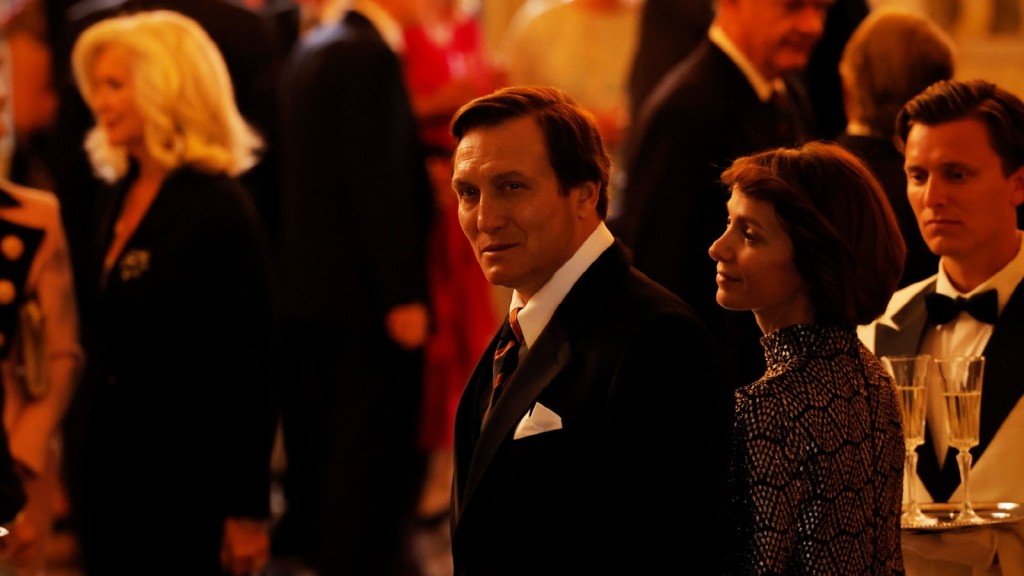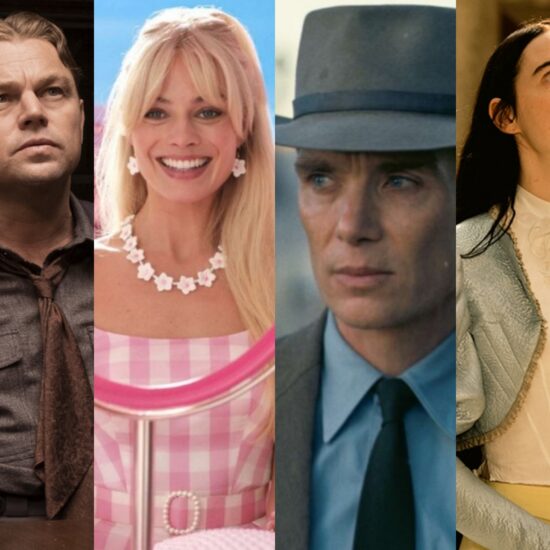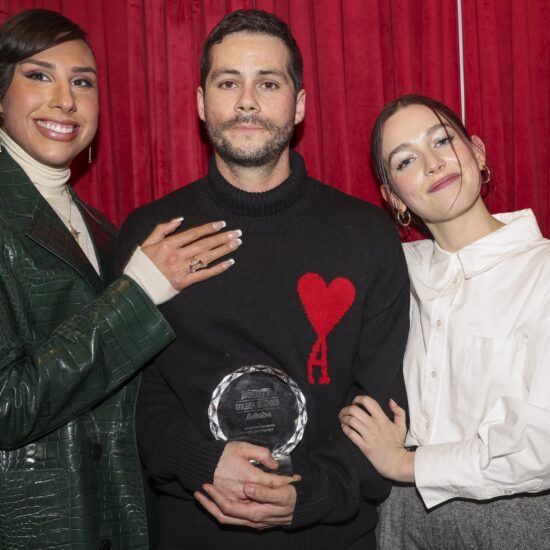
“The day after Alfred Herrhausen’s murder, I wanted to make a film about it,” says German producer Gabriela Sperl. “Because I knew the official story we were being told just wasn’t the truth.”
This was back in 1986 and Herrhausen, the charismatic chairman of the board of German financial giant Deutsche Bank, had just been blown up, his armored Mercedes-Benz shredded by a 15 lbs bomb hidden in a bag on a bicycle parked next to the route Herrhausen and his security convoy traveled by every day.
It was a shocking and surprising act of assassination, quickly blamed on the Red Army Faction (RAF), a far-left German terror group which, a decade earlier, had killed a number of prominent capitalist figures, including Jürgen Ponto, the head of Dresdner Bank, and Hanns Martin Schleyer, the president of the German employers association. The RAF claimed responsibility, but the actual bombers were never found and many of the details of the case didn’t add up.
The RAF, by that time in its “third generation” — the original members were all dead, imprisoned or on the lam and younger extremists had taken up the cause — was not known for its tactical nous and an attack as sophisticated and technically complex as the Herrhausen bombing seemed beyond them. Then there was the question of the target: Herrhausen was a banker but he was a progressive who called for debt relief of third-world countries. At the time of his killing, he had pushed through an agreement — negotiated with German Chancellor Helmut Kohl and then-Soviet leader Mikhail Gorbachev — to secretly loan the Soviet Union 8 billion Deutschmarks to keep their economy afloat, in exchange for the Soviets looking the other way as Kohl and West Germany pushed for reunification with the Soviet-controlled GDR. Hardly the epitome of communist-bashing capitalist swine.
Over the years, the question of who killed Alfred Herrhausen and why has become an obsession for German true crime fans and the source of many a homegrown conspiracy theory. Andres Veiel’s award-winning 2001 documentary Black Box BRD looked at the lives of Herrhausen and Wolfgang Grams, an RAF terrorist thought to have been involved in the assassination, who was killed in a suspicious police shootout in 1993 but skimmed over details of the killing itself.
“There were many attempts to tell the story over the years but they never panned out,” says Sperl. “But I was in contact with Herrhausen’s widow over the years and finally, about 5 years ago, she said: ‘Ok,’ we can do this now.”
The result, five years later, is Herrhausen — The Banker and The Bomb, a new limited series that premiered at the Munich Film Festival this week, where it won the prize for best mini-series. The jury called the four-part speculative drama an “impressive” feat of storytelling. with an “authentic depiction” of German history combined with a “gripping narrative style.”
“This is a story that takes place at the end of the 1980s but it’s shockingly relevant to today,” says Pia Strietmann, who directed the series. “The challenge was to take this historic material, with all the research that Gabriela had done, and tell the story in a modern way for a modern audience.”
Produced by Sperl together with X-Filme Creative Pool (Babylon Berlin), the speculative drama stars Oliver Masucci, of Look Who’s Back and Netflix’s Dark, as Herrhausen. Fremantle is handling international sales.
Masucci spoke with The Hollywood Reporter from Munich about how he played a “heroic capitalist,” the dramatic power of conspiracy theories, and how the violence of the era shaped his own life.
You were born in 1968, you lived through the period depicted in the series. How did you experience that turbulent time, and the assassination of Alfred Herrhausen?
I was very aware of it, and also aware that we weren’t being told the truth about what happened. As we know now, because the case still hasn’t been solved, no killer has been brought to justice. The terror attacks at the time were very personal to me. Gerold von Braunmühl [a senior West-German diplomat] lived on the same street as my family in Bonn. His daughter was a friend of mine. I was coming home from my parent’s restaurant — my father owned several Italian restaurants in the city — and the street was blocked off. Von Braunmühl has been shot, assassinated, outside his house, on the street a few hundred feet from my home [by a member of the RAF]. It was the moment the world stopped making sense to me. The moment I swore off ideologies of all kinds. From that moment on, I’ve had a deep distrust of any kind of ideology, political or otherwise. A deep suspicion of authority and what we are being told about how the world works.
In your research for the role, did you find a personal connection to Alfred Herrhausen? Are you at all similar?
I think we have a lot in common. I’m also a very impatient person driven to protest social conventions and constraints. I want everything to happen faster, for systems to change for the better. And for it to happen now. If I can quote Nietzsche, the age of the master builders is over, the time when people tried to create something new, to form the future. We’re in the age of actors, of self-promoters. The time when people laid foundations, stone on stone, of ideas and structures that would last beyond their own death, into the future has been replaced by this, hopefully temporary, phase of populism, whether left-wing or right-wing populist, it doesn’t matter. But Alfred Herrhausen was a builder. He analyzed the socio-political processes of his time, he was aware of his responsibility as a capitalist and saw capitalism as a way to make society better, not as an end in itself. At some point along the line, capitalism lost that, that humanist drive, and it became all about profit. But Herrhausen was still thinking innovatively about the future. His idea of debt relief for poor countries was about the future. It was about creating the market in those countries, about building them up, so they can make money to pay off their debts. That was a really big and really radical idea at the time.
Having a character like him, a heroic capitalist, feels really radical at this moment in time, when bankers and corporate executives are demonized.
Absolutely, absolutely! But he was one of those people who could see the other perspective. It’s like the discussion these days about the need to stop growth, for us all to get by with less. That might be fine for the rich countries but it ignores the fact that there are a whole lot of people worldwide who don’t have the excess they can do without. It takes someone like Herrhausen to see the other’s perspective to really achieve progress.
You’ve played a lot of real-life figures from German history — from a fictional Hitler in Look Who’s Back to radical filmmaker Rainer Werner Fassbinder in Enfant Terrible, to a version of the artist Joseph Beuys in the Oscar-nominated Never Look Away. But here the story was based on exhaustive research in the real-life Herrhausen. Did that impact how you played the character, did you draw from that research?
No, not really. I always approach my figures in the same way, from their story, their character. There has to be something in them, in the story, that I can connect to myself. I’m always looking for a parallel with myself because I can’t play anyone else. I can always just be myself. The role helps me shed more light on a certain part of my personality. So with Herrhausen, for example, maybe I’m focusing more on my conservative side, but at the same time that impatient bit of myself, that wants things to go faster, wants the world to get better.
The series is set during the Cold War, when West Germany was trying to reach out to the Soviets, something Herrhausen supported. But shortly before you started production, Russia invaded Ukraine. Did that change your take on this story and on the history it portrays?
Yes, definitely. The Cold War is coming back, I think that’s Putin’s plan. Back then, the line was “Wandel durch Handel” (transformation through trade). The idea was if you do business with the Soviets, you can transform their society, and make Russia democratic. After the invasion of Ukraine, I told the director and the producers: “Well, how can we believe that now? It’s obvious it didn’t work.” But I think Herrhausen wasn’t someone who would have been in favor of abolishing the army eliminating the nuclear threat toward Russia. I don’t think he would have advocated what the German government did, when they tried to break away from the Americans, converting their military barracks into kindergartens, calling the Bundeswehr obsolete because Russia wasn’t a threat anymore. That peace would just happen on its own. Now we have a government that’s finding out we have no tanks, no weapons anymore, and we are completely dependent on the Americans when it comes to defense. I don’t think Herrhausen would have been that naive.
The series offers up a speculative theory as to what actually happened with the Herrhausen assassination, that the East German government provided the bomb and the training to the RAF to carry out the killing. That they wanted Herrhausen dead because they saw his support of the Soviet Union as a threat to their future, to the future of the GDR. Were you convinced by this theory?
Well yes and no. I never thought that the RAF acted alone in the bombing. For me, the third generation of the RAF was an organization that pursued terrorism as a business model. It was too weak and too disorganized — it didn’t get along with the other far-left terror groups in Europe, the Brigada Rossa in Italy, the ETA in Spain, the French terrorist groups — to be able to carry out something like this. And the bomb that killed Herrhausen was one that the RAF couldn’t have built themselves. It’s clear there were a lot of other people involved, people interested in getting rid of Herrhausen. What’s fascinating about the research they did on this series is the information that came from the Stasi archives, because those documents are publicly accessible in Germany. But then, when we looked at them, there was nothing on Herrhausen, even though he had been under constant surveillance. When we asked the Americans, the English and the Russians for information, we got these long letters back, saying not only is this information top-secret but if we continue to try to obtain these documents, they will take legal action against us. Even decades later, everything about this is buried under levels and levels of secrecy. So that’s where conspiracy theory comes in. There used to be a big tradition in Europe of doing these political conspiracy thrillers, which play with history to question the stories were have been told. Nowadays, the idea of conspiracy theories has become so negatively charged, and so associated with extremism, but conspiracy theories are incredibly good for playing with our ideas of the past. It’s easier to do this in America than in Germany because were are very sensitive about our past and anything that isn’t a documentary is viewed suspiciously. But I’m an actor and I’m interested in entertaining the viewers. We have a thesis here, that’s exciting and entertaining, that makes you think about the history you think you know. It’s a bit of a game, but I’m ok with that. I want people to come and play.













